
On the afternoon of March 18th, 2021, the NSD (hereinafter referred to as NSD) at Peking University held the 56th quarterly “China Economic Observation (CEO)” in the Beiling Lecture Hall of Peking University Science Park and on live stream platforms simultaneously. With the theme of “Potential Policies and Economic Performance after the Two Sessions”, the event covered various topics and highlights at the Two Sessions, such as emerging challenges, a new landscape of development, balance of payments and foreign exchange rates, opening of the financial sector, etc. Seven professors from the NSD shared their interpretation and answered questions related to these issues at the widely watched event of policy and economy discussions shortly following the“Two Sessions" in 2021.
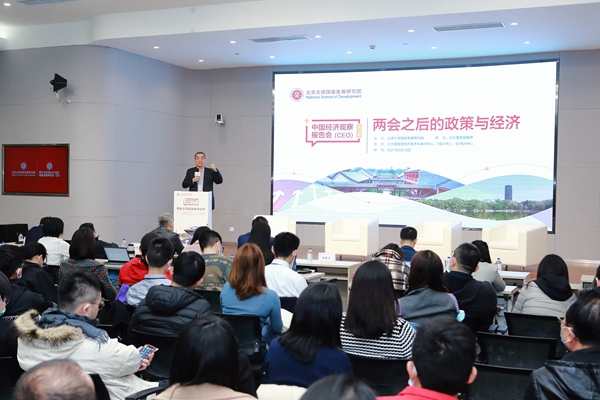
The seven speakers are (by order of speech) Justin Yifu Lin, Professor and Honorary Dean of NSD, Dean of Institute of New Structural Economics, and Dean of Institute of South-South Cooperation and Development at Peking University; Yu Miaojie, Deputy Dean of NSD at Peking University, Cheung-Kong Distinguished Scholar of Ministry of Education of China, and winner of National Science Fund for Distinguished Young Scholars; Lu Feng, Sinar Mas Professor of the NSD at Peking University; Huang Yiping, Deputy Dean and Sinar Mas Professor of NSD, and Director of Institute of Digital Finance at Peking University; Gordon Guo’en Liu, Dean of Institute for Global Health and Development, Director of Academic Committee of NSD at Peking University, and Cheung-Kong Distinguished Scholar of Ministry of Education of China; Xu Jintao, Deputy Dean of NSD and Director of Research Center for Environment and Energy Economy at Peking University; Yao Yang, Dean of NSD, Executive Dean of Institute of South-South Cooperation and Development, and Director of China Center for Economic Research at Peking University.
The event had two sessions with the subtitles of “Development and Reform of Open Economy” and “14th Five-Year Plan and Vision Goals” respectively, and each session consisted of keynote speeches, round-table discussions and media Q&A. The moderators of the two sessions were Huang Zhuo, Assistant Dean and Associate Professor (Tenure) of NSD, and Deputy Director of Institute of Digital Finance at Peking University, and Wang Min, Assistant Dean and Associate Professor (Tenure) of NSD, and Deputy Director of Research Center for Environment and Energy Economy at Peking University respectively.
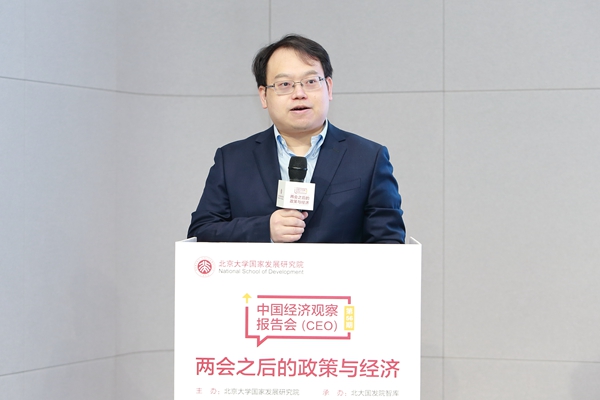
Huang Zhuo --- Moderator of Topic 1
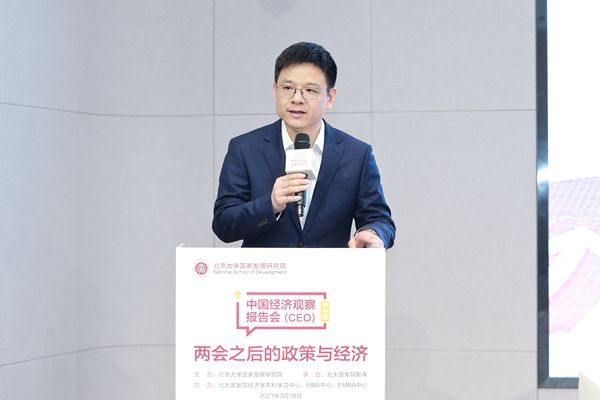
Wang Min --- Moderator of Topic 2
Before the opening of the special sessions, Professor Justin Yifu Lin gave a speech titled “New Challenges and Countermeasures of Chinese Economy”. He noted that development is the foundation and key to solution of many challenges such as population aging, carbon emission reduction and carbon peak in light of the overall strategy of the great rejuvenation of the Chinese nation and unprecedented changes in the new century. To evaluate China's future potential of development, we should examine the gap between us and developed countries, and give rise to the full growth potential while ensuring noticeable improvement in quality and efficiency. Considering the demand for high-quality development and the national strategic advantages, China is very likely to achieve 5%-6% growth per year with the potential up to 8% during the 14th Five-Year Plan period.
Professor Lin answered questions from the audience as to when to cross the middle income trap, the favorable conditions and obstacles in doing so, and how to break through the life-or-death technologies.
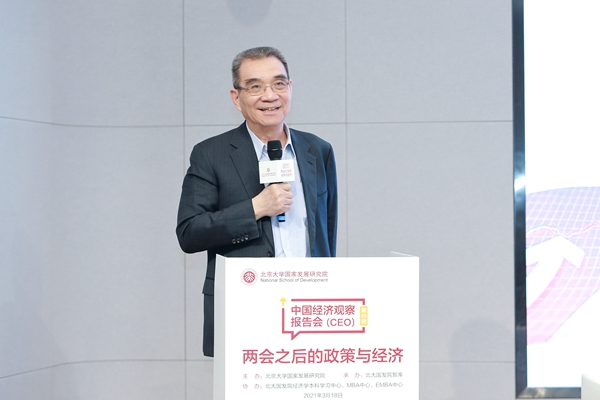
Justin Yifu Lin
In the keynote speech of topic 1, encompassing the theme of "all-round opening up in the new landscape of development", Professor Yu Miaojie interpreted the guiding opinions on opening up in the 14th Five-Year Plan in four aspects: stable trade volume and quantity improvement in foreign trade, a slimmer negative list of service trade as the key to effective utilization of foreign investment, co-construction of the “ Belt and Road” initiative, and reform at home and opening up to the outside world.
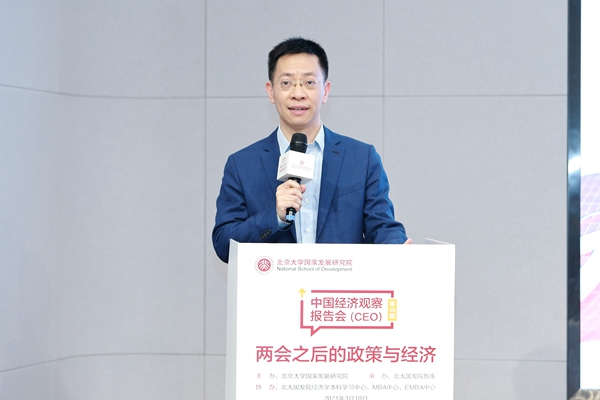
Yu Miaojie
With the theme of “issues of balance of payments and foreign exchange rates”, Professor Lu Feng reviewed the changes of Renminbi exchange rates during the 13th Five-Year Plan period and analyzed their prospects. He called the past five years an important stage in the currency’s history and suggested that the Renminbi exchange rates would show a new normal of significant fluctuations and appreciation trend, which would also be subject to the random impact from, for example, financial risks and geopolitics.
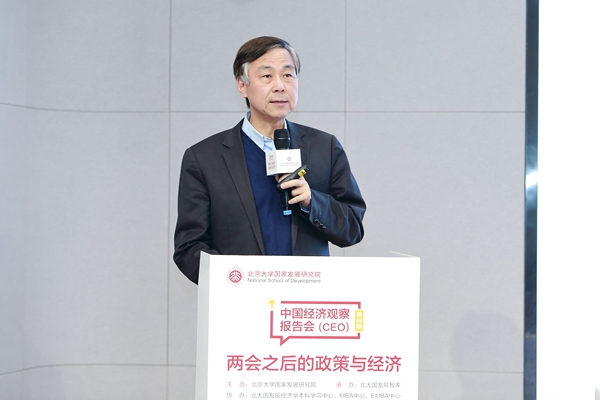
Lu Feng
Finally, Professor Huang Yiping shared two viewpoints on the theme of “opening in the financial sector”: The opening up policy is an important safeguard for building a new pattern of double-circulation development; reliance on the domestic big circulation does not preclude doing business with the outside world; the ultimate goal is to develop with the world together, and China will finally enter the center of the world stage. The next step is to steadily promote opening of the financial sector, balance the relationship between opening and stability, and avoid possible financial crises.
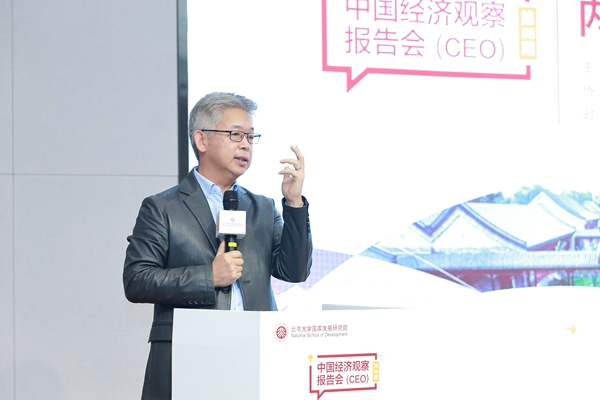
Huang Yiping
During the round-table discussions and media Q&A, the three professors answered questions from the audience as to follow-up of the Phase I Economic and Trade Agreement between China and the United States, high housing prices, digital cash and the internationalization of Renminbi.
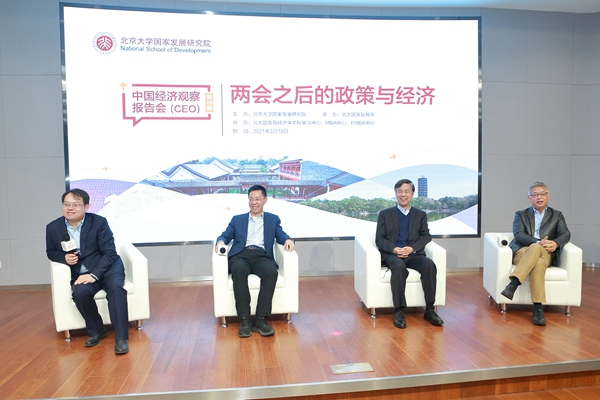
Round-table Discussion of Topic 1
In the keynote speech of Topic 2, Professor Gordon Guo'en Liu first focused on “health and economic growth in China in the post-epidemic era” to summarize the significance of the “Health in China Action 2030” released in the 13th Five-Year Plan period in three aspects, i.e. the current state of COVID-19, China's economic growth, and the increasing proportion of demand for medical and health service in the consumption structure, and then interpreted the opportunities and challenges posed by the health-oriented market trends to China's economic growth.
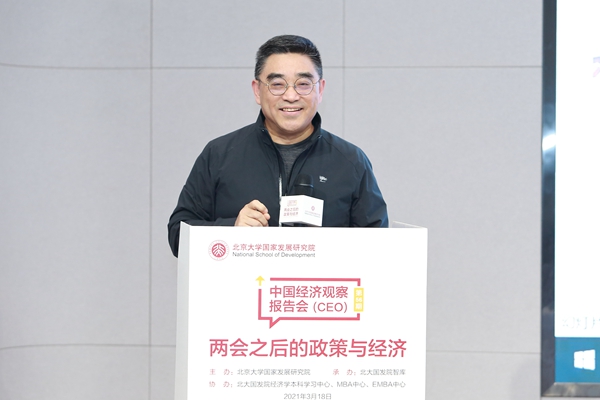
Gordon Guo'en Liu
With the theme of “carbon peak and green economy transformation”, Professor Xu Jintao analyzed the gap in China at present against to the latest goals of carbon emission reduction and carbon neutralization, and pointed out that the growth model must be changed. He summarized the requirements with respect to the latest goals in the 14th Five-Year Plan as structural adjustment and policy change, that is, adjusting the energy and ecological structure and changing the dependence on administrative means to economic policies.
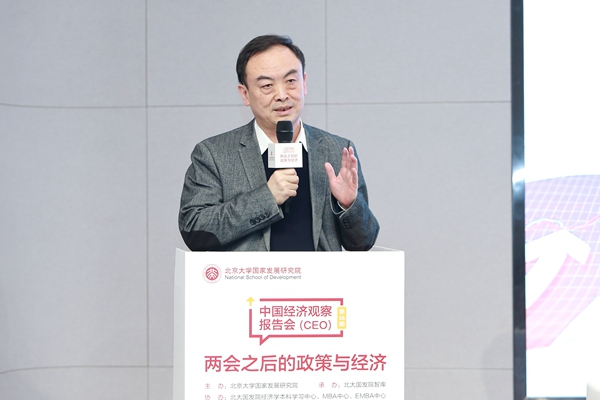
Xu Jintao
Professor Yao Yang talked about “urbanization 2.0 and rural revitalization”. He forecast two possible directions of China's urbanization in the future. One is that the population in the eastern coastal areas becomes concentrated in urbanized areas, while the other is that the rural residents in the more than 1,800 counties and cities gradually move to the county seats. In addition, county seats are likely to merge with villages in the future. Finally, he summarized the significance of urbanization to China's economy and the supporting measures required for further urbanization.
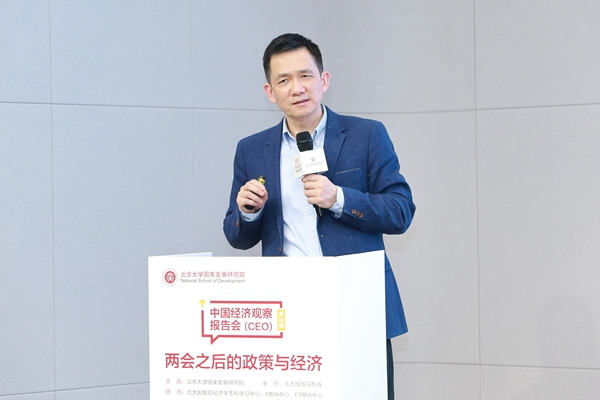
Yao Yang
During the round-table discussions and media Q&A, the three professors answered questions from the audience as to the impact of COVID-19, environmental policies and economic development, urbanization and regional development.
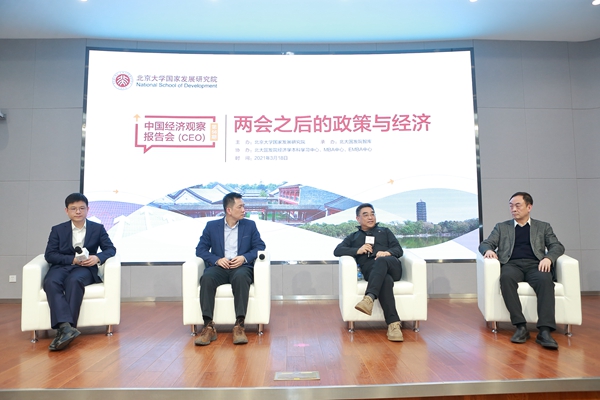
Round-table Discussion of Topic 2
The seminar received strong support from the Undergraduate Teaching Center, MBA Center, and EMBA Center of National School at Development Peking University as well as the live stream platforms of Baidu, China Business Journal, Sina, Caijing Magazine, Sohu Finance, Nandu Live, Xinhua Thinker, which MBA, The Beijing News, Zhi Shi, etc. The event was covered by nearly 100 media organizations.
About China Economic Observation
China Economic Observation (CEO) is the name of quarterly seminars chaired by Professor Lu Feng since its inception in 2005. Leveraging the research resources of the National School of Development at Peking University, the seminar provides a forum for discussions on the hot topics of reform, current macroeconomic situation, supply and demand of commodities and their prices, systems and policies related to the investment environment, and other issues and trends to strengthen the ties between the National School of Development and all circles of the society and to promote attention and discussions on China's economic development in the academia.
Chinese Version: Wang Zhiqin
Editor: Wang Xianqing, Bai Yao